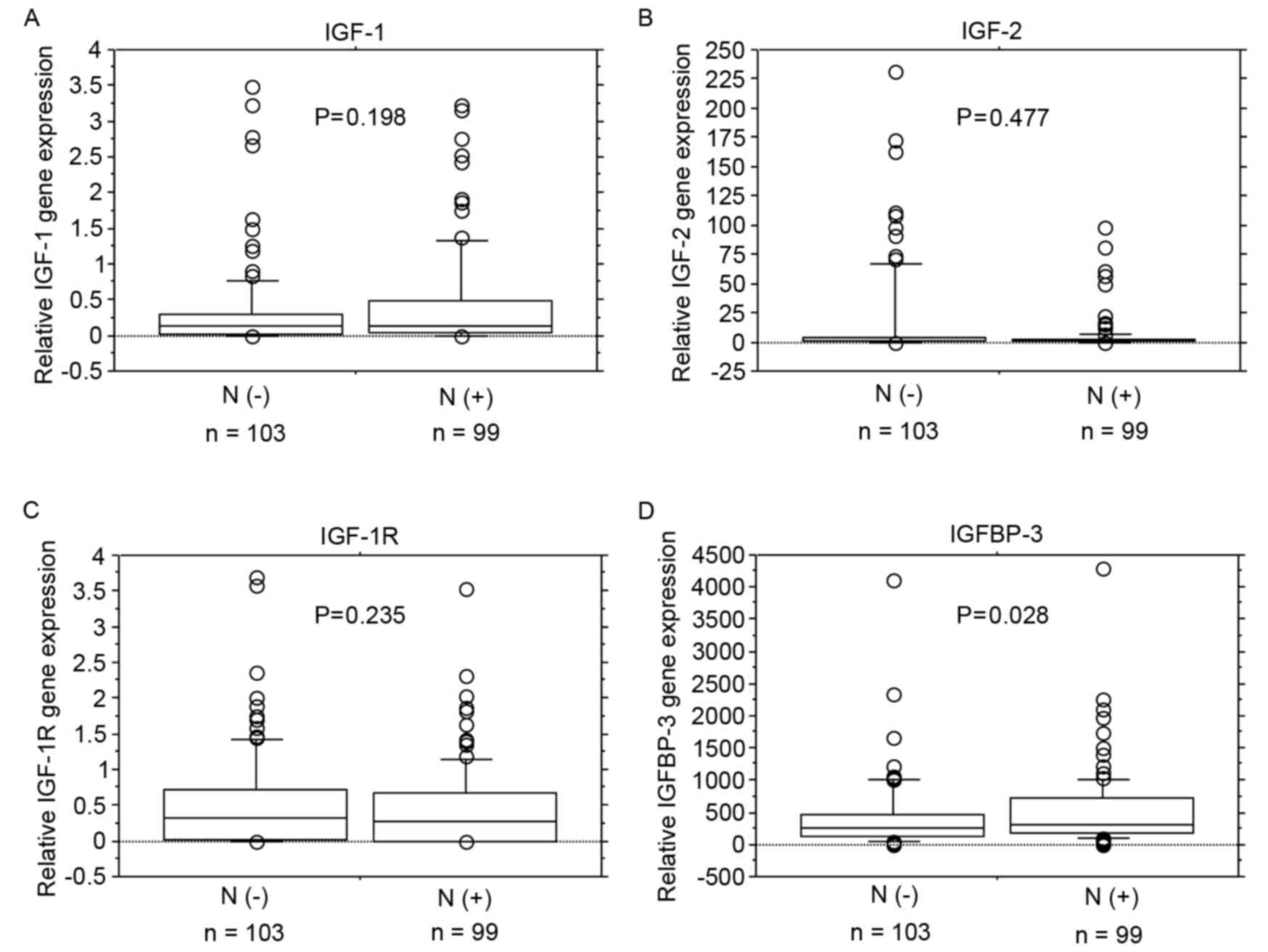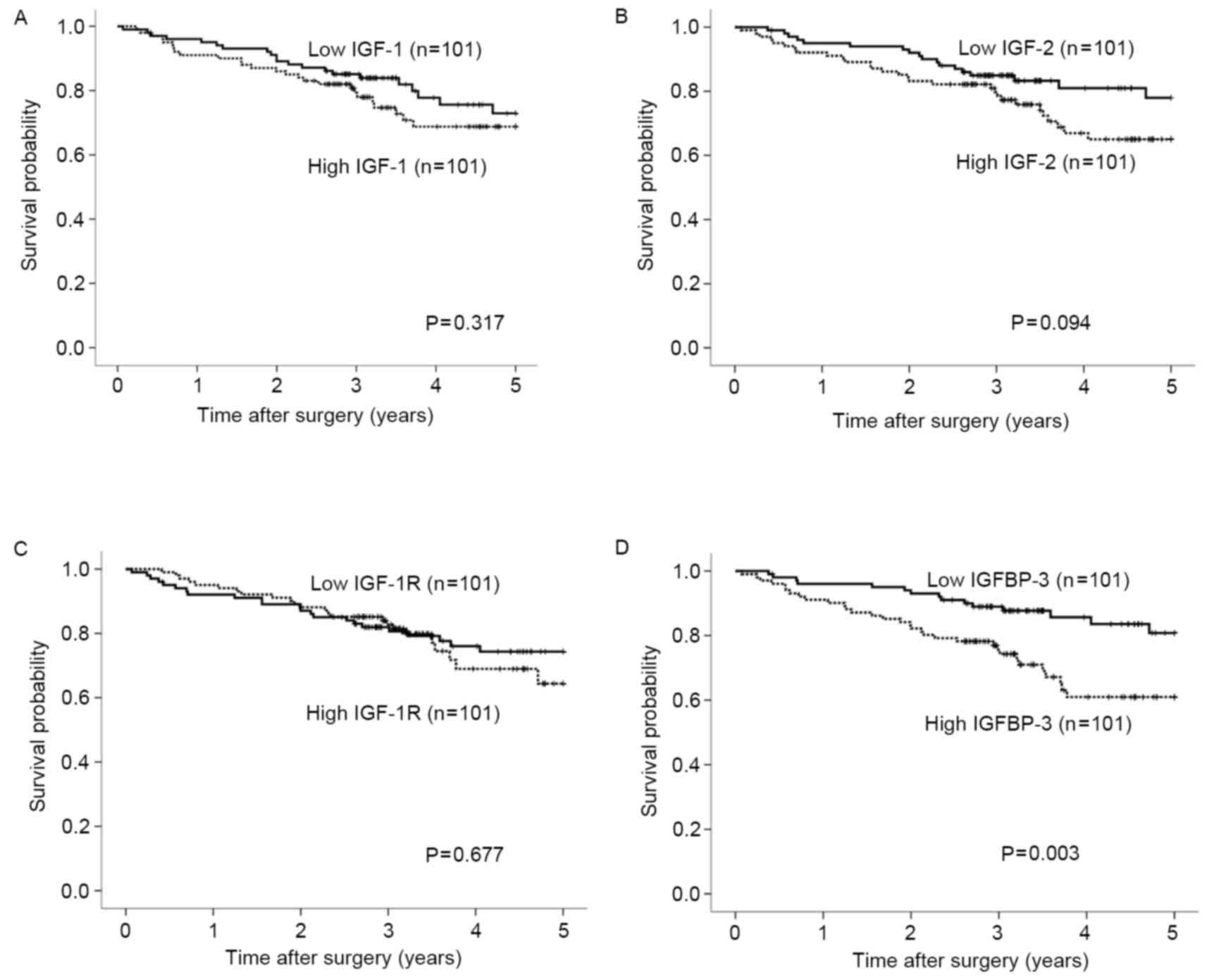|
1
|
Ma J, Pollak MN, Giovannucci E, Chan JM,
Tao Y, Hennekens CH and Stampfer MJ: Prospective study of
colorectal cancer risk in men and plasma levels of insulin-like
growth factor (IGF)-I and IGF-binding protein-3. J Natl Cancer
Inst. 91:620–625. 1999. View Article : Google Scholar : PubMed/NCBI
|
|
2
|
Shikata K, Ninomiya T and Kiyohara Y:
Diabetes mellitus and cancer risk: Review of the epidemiological
evidence. Cancer Sci. 104:9–14. 2013. View Article : Google Scholar : PubMed/NCBI
|
|
3
|
Clayton PE, Banerjee I, Murray PG and
Renehan AG: Growth hormone, the insulin-like growth factor axis,
insulin and cancer risk. Nat Rev Endocrinol. 7:11–24. 2011.
View Article : Google Scholar : PubMed/NCBI
|
|
4
|
Renehan AG, Zwahlen M, Minder C, O'Dwyer
ST, Shalet SM and Egger M: Insulin-like growth factor (IGF)-I, IGF
binding protein-3, and cancer risk: Systematic review and
meta-regression analysis. Lancet. 363:1346–1353. 2004. View Article : Google Scholar : PubMed/NCBI
|
|
5
|
Durai R, Yang W, Gupta S, Seifalian AM and
Winslet MC: The role of the insulin-like growth factor system in
colorectal cancer: Review of current knowledge. Int J Colorectal
Dis. 20:203–220. 2005. View Article : Google Scholar : PubMed/NCBI
|
|
6
|
Rinaldi S, Cleveland R, Norat T, Biessy C,
Rohrmann S, Linseisen J, Boeing H, Pischon T, Panico S, Agnoli C,
et al: Serum levels of IGF-I, IGFBP-3 and colorectal cancer risk:
Results from the EPIC cohort, plus a meta-analysis of prospective
studies. Int J Cancer. 126:1702–1715. 2010.PubMed/NCBI
|
|
7
|
Kawamoto K, Onodera H, Kondo S, Kan S,
Ikeuchi D, Maetani S and Imamura M: Expression of insulin-like
growth factor-2 can predict the prognosis of human colorectal
cancer patients: Correlation with tumor progression, proliferative
activity and survival. Oncology. 55:242–248. 1998. View Article : Google Scholar : PubMed/NCBI
|
|
8
|
Foulstone E, Prince S, Zaccheo O, Burns
JL, Harper J, Jacobs C, Church D and Hassan AB: Insulin-like growth
factor ligands, receptors, and binding proteins in cancer. J
Pathol. 205:145–153. 2005. View Article : Google Scholar : PubMed/NCBI
|
|
9
|
Firth SM and Baxter RC: Cellular actions
of the insulin-like growth factor binding proteins. Endocr Rev.
23:824–854. 2002. View Article : Google Scholar : PubMed/NCBI
|
|
10
|
Butt AJ, Martin JL, Dickson KA, McDougall
F, Firth SM and Baxter RC: Insulin-like growth factor binding
protein-3 expression is associated with growth stimulation of T47D
human breast cancer cells: The role of altered epidermal growth
factor signaling. J Clin Endocrinol Metab. 89:1950–1956. 2004.
View Article : Google Scholar : PubMed/NCBI
|
|
11
|
Sobin LH and Wittekind C: TNM:
Classification of Malignant Tumours. 6th. John Wiley & Sons;
Hoboken, NJ: 2002
|
|
12
|
Larionov A, Krause A and Miller W: A
standard curve based method for relative real time PCR data
processing. BMC Bioinformatics. 6:622005. View Article : Google Scholar : PubMed/NCBI
|
|
13
|
Pollak M: Insulin-like growth factor
physiology and cancer risk. Eur J Cancer. 36:1224–1228. 2000.
View Article : Google Scholar : PubMed/NCBI
|
|
14
|
Freier S, Weiss O, Eran M, Flyvbjerg A,
Dahan R, Nephesh I, Safra T, Shiloni E and Raz I: Expression of the
insulin-like growth factors and their receptors in adenocarcinoma
of the colon. Gut. 44:704–708. 1999. View Article : Google Scholar : PubMed/NCBI
|
|
15
|
Nosho K, Yamamoto H, Taniguchi H, Adachi
Y, Yoshida Y, Arimura Y, Endo T, Hinoda Y and Imai K: Interplay of
insulin-like growth factor-II, insulin-like growth factor-I,
insulin-like growth factor-I receptor, COX-2, and matrix
metalloproteinase-7, play key roles in the early stage of
colorectal carcinogenesis. Clin Cancer Res. 10:7950–7957. 2004.
View Article : Google Scholar : PubMed/NCBI
|
|
16
|
Keku TO, Sandler RS, Simmons JG, Galanko
J, Woosley JT, Proffitt M, Omofoye O, McDoom M and Lund PK: Local
IGFBP-3 mRNA expression, apoptosis and risk of colorectal adenomas.
BMC Cancer. 8:1432008. View Article : Google Scholar : PubMed/NCBI
|
|
17
|
Peters G, Gongoll S, Langner C, Mengel M,
Piso P, Klempnauer J, Rüschoff J, Kreipe H and von Wasielewski R:
IGF-1R, IGF-1 and IGF-2 expression as potential prognostic and
predictive markers in colorectal-cancer. Virchows Arch.
443:139–145. 2003. View Article : Google Scholar : PubMed/NCBI
|
|
18
|
Shiratsuchi I, Akagi Y, Kawahara A,
Kinugasa T, Romeo K, Yoshida T, Ryu Y, Gotanda Y, Kage M and
Shirouzu K: Expression of IGF-1 and IGF-1R and their relation to
clinicopathological factors in colorectal cancer. Anticancer Res.
31:2541–2545. 2011.PubMed/NCBI
|
|
19
|
Mita K, Nakahara M and Usui T: Expression
of the insulin-like growth factor system and cancer progression in
hormone-treated prostate cancer patients. Int J Urol. 7:321–329.
2000. View Article : Google Scholar : PubMed/NCBI
|
|
20
|
Furukawa M, Raffeld M, Mateo C, Sakamoto
A, Moody TW, Ito T, Venzon DJ, Serrano J and Jensen RT: Increased
expression of insulin-like growth factor I and/or its receptor in
gastrinomas is associated with low curability, increased growth,
and development of metastases. Clin Cancer Res. 11:3233–3242. 2005.
View Article : Google Scholar : PubMed/NCBI
|
|
21
|
Georges RB, Adwan H, Hamdi H, Hielscher T,
Linnemann U and Berger MR: The insulin-like growth factor binding
proteins 3 and 7 are associated with colorectal cancer and liver
metastasis. Cancer Biol Ther. 12:69–79. 2011. View Article : Google Scholar : PubMed/NCBI
|
|
22
|
Zhong LP, Yang X, Zhang L, Wei KJ, Pan HY,
Zhou XJ, Li J, Chen WT and Zhang ZY: Overexpression of insulin-like
growth factor binding protein 3 in oral squamous cell carcinoma.
Oncol Rep. 20:1441–1447. 2008.PubMed/NCBI
|
|
23
|
Hansel DE, Rahman A, House M, Ashfaq R,
Berg K, Yeo CJ and Maitra A: Met proto-oncogene and insulin-like
growth factor binding protein 3 overexpression correlates with
metastatic ability in well-differentiated pancreatic endocrine
neoplasms. Clin Cancer Res. 10:6152–6158. 2004. View Article : Google Scholar : PubMed/NCBI
|
|
24
|
Xue A, Scarlett CJ, Jackson CJ, Allen BJ
and Smith RC: Prognostic significance of growth factors and the
urokinase-type plasminogen activator system in pancreatic ductal
adenocarcinoma. Pancreas. 36:160–167. 2008. View Article : Google Scholar : PubMed/NCBI
|
|
25
|
Sheen-Chen SM, Chou FF, Hsu W, Huang CC,
Eng HL and Tang RP: Lack of prognostic value of insulin-like growth
factor-1 in patients with breast cancer: Analysis with tissue
microarray. Anticancer Res. 27:3541–3544. 2007.PubMed/NCBI
|
|
26
|
Xu Z, Liu F, Qi X and Li J: Relationship
between insulin-like growth factor II and prognosis of colorectal
cancer. Zhonghua Wai Ke Za Zhi. 37:718–720, 743. 1999.(In Chinese).
PubMed/NCBI
|
|
27
|
Nakamura M, Miyamoto S, Maeda H, Zhang SC,
Sangai T, Ishii G, Hasebe T, Endoh Y, Saito N, Asaka M and Ochiai
A: Low levels of insulin-like growth factor type 1 receptor
expression at cancer cell membrane predict liver metastasis in
Dukes' C human colorectal cancers. Clin Cancer Res. 10:8434–8441.
2004. View Article : Google Scholar : PubMed/NCBI
|
|
28
|
Shiono S, Ishii G, Nagai K, Murata Y,
Tsuta K, Nitadori J, Kodama T and Ochiai A: Immunohistochemical
prognostic factors in resected colorectal lung metastases using
tissue microarray analysis. Eur J Surg Oncol. 32:308–309. 2006.
View Article : Google Scholar : PubMed/NCBI
|
|
29
|
Vestey SB, Perks CM, Sen C, Calder CJ,
Holly JM and Winters ZE: Immunohistochemical expression of
insulin-like growth factor binding protein-3 in invasive breast
cancers and ductal carcinoma in situ: Implications for
clinicopathology and patient outcome. Breast Cancer Res.
7:R119–R129. 2005. View
Article : Google Scholar : PubMed/NCBI
|
|
30
|
Sheen-Chen SM, Zhang H, Huang CC and Tang
RP: Insulin-like growth factor-binding protein-3 in breast cancer:
Analysis with tissue microarray. Anticancer Res. 29:1131–1135.
2009.PubMed/NCBI
|
|
31
|
Kim JH, Cho YH, Park YL, Sohn JH and Kim
HS: Prognostic significance of insulin growth factor-I receptor and
insulin growth factor binding protein-3 expression in primary
breast cancer. Oncol Rep. 23:989–995. 2010. View Article : Google Scholar : PubMed/NCBI
|
|
32
|
Yu H, Levesque MA, Khosravi MJ,
Papanastasiou-Diamandi A, Clark GM and Diamandis EP: Insulin-like
growth factor-binding protein-3 and breast cancer survival. Int J
Cancer. 79:624–628. 1998. View Article : Google Scholar : PubMed/NCBI
|
|
33
|
Santosh V, Arivazhagan A, Sreekanthreddy
P, Srinivasan H, Thota B, Srividya MR, Vrinda M, Sridevi S,
Shailaja BC, Samuel C, et al: Grade-specific expression of
insulin-like growth factor-binding proteins-2, −3, and −5 in
astrocytomas: IGFBP-3 emerges as a strong predictor of survival in
patients with newly diagnosed glioblastoma. Cancer Epidemiol
Biomarkers Prev. 19:1399–1408. 2010. View Article : Google Scholar : PubMed/NCBI
|
|
34
|
Aishima S, Basaki Y, Oda Y, Kuroda Y,
Nishihara Y, Taguchi K, Taketomi A, Maehara Y, Hosoi F, Maruyama Y,
et al: High expression of insulin-like growth factor binding
protein-3 is correlated with lower portal invasion and better
prognosis in human hepatocellular carcinoma. Cancer Sci.
97:1182–1190. 2006. View Article : Google Scholar : PubMed/NCBI
|
|
35
|
Papadimitrakopoulou VA, Brown EN, Liu DD,
El-Naggar AK, Lee Jack J, Hong WK and Lee HY: The prognostic role
of loss of insulin-like growth factor-binding protein-3 expression
in head and neck carcinogenesis. Cancer Lett. 239:136–143. 2006.
View Article : Google Scholar : PubMed/NCBI
|
|
36
|
Schmid MC, Bisoffi M, Wetterwald A,
Gautschi E, Thalmann GN, Mitola S, Bussolino F and Cecchini MG:
Insulin-like growth factor binding protein-3 is overexpressed in
endothelial cells of mouse breast tumor vessels. Int J Cancer.
103:577–586. 2003. View Article : Google Scholar : PubMed/NCBI
|
|
37
|
Granata R, Trovato L, Lupia E, Sala G,
Settanni F, Camussi G, Ghidoni R and Ghigo E: Insulin-like growth
factor binding protein-3 induces angiogenesis through IGF-I- and
SphK1-dependent mechanisms. J Thromb Haemost. 5:835–845. 2007.
View Article : Google Scholar : PubMed/NCBI
|
|
38
|
Yu H, Levesque MA, Khosravi MJ,
Papanastasiou-Diamandi A, Clark GM and Diamandis EP: Associations
between insulin-like growth factors and their binding proteins and
other prognostic indicators in breast cancer. Br J Cancer.
74:1242–1247. 1996. View Article : Google Scholar : PubMed/NCBI
|
|
39
|
Martin JL, Weenink SM and Baxter RC:
Insulin-like growth factor-binding protein-3 potentiates epidermal
growth factor action in MCF-10A mammary epithelial cells.
Involvement of p44/42 and p38 mitogen-activated protein kinases. J
Biol Chem. 278:2969–2976. 2003. View Article : Google Scholar : PubMed/NCBI
|
|
40
|
Martin JL, de Silva HC, Lin MZ, Scott CD
and Baxter RC: Inhibition of insulin-like growth factor-binding
protein-3 signaling through sphingosine kinase-1 sensitizes
triple-negative breast cancer cells to EGF receptor blockade. Mol
Cancer Ther. 13:316–328. 2014. View Article : Google Scholar : PubMed/NCBI
|

















